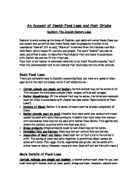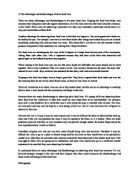From the perspective of Rabbi S. R. Hirsch, a chok, is a mitzvah that expresses the recognition that everything created by G-d has a designated purpose, and as such has to be accorded due respect. For Hirsch, Kashrut is about respecting the body. To respect the body involves keeping the diet, G-d designated for the body.
Chokim, generally express our obedience to G-d. By performing an action, which transcends the finity of intellect, we are automtaically performing it out of an obedience to G-d. Compare this to rational mitzvot, which may be fulfilled simply because they make sense to us. Chokim can only be done out of obedience as there is no rationality that we can perceive in them. Chokim really ensure that we do a mitzvah out of obedience to G-d, and as thus ensures that our obedience to G-d with regard to other mitzvot are synchronised above the realms of intellect. If the reasons for all mitzvot were blaringly obvious, there is a possibility that we will be acting out of an obedience to our own mind and intellect, rather than an obedience to G-d ; which could well be categorised as serving oneself, avodah zorah instead of serving G-d. Which really completely misses the whole monotheistic nature of Judaism.
Another Jewish theory on mans relationship to the inanimate can be found in the philosophy of Rabbi Shneur Zalman Liadi, in his work ‘Tanya.’ The inanimate world is full of holy sparks. Kosher foods are those that contain sparks, that have the potential of being elevated through the service of a Jew. When a Jew eats food with the intention of serving G-d, the spark within it is released from its physical trappings. Eating becomes a spiritual service in and of itself and the laws of Kashrut define which foods contain an unbound spark, which can be elevated through the service of a Jew. (this fits in with the hebrew for permissable ‘mutar’ literally means ‘unbound’- the spark is unbound from the physicality within which it is entrapped, and can be elevated) However if the food is of the category that G-d does not want us to partake of, no matter what we do to it we cannot make it holy, it can only take us down with it. Employment of the Rabbi Shneur Zalman of Liadi’s approach to eating, sees the transformation of the physical food, into spiritual sustenance. This transformation of a useless, inanimate, independant entity into a tool for serving G-d, creates an elevation of physicality, that according to Rabbi Shneur Zalman of Liadi, was the whole purpose of creation, that the even physicality should be made holy. Thus the physical kosher food, becomes food for the soul, directly helping a Jew to grow spiritually (because he is doing what G-d wants him to do by eating kosher) and indirectly the food gives the body energy to serve G-d in other physical persuits, also boosting the soul. All in all kosher food, if eaten in the right manner acts as food for the soul, whereas no benefit can be gained from kosher food, it can only drag a person down with it. By eating kosher food a Jew refines the animal he is eating.
Nachmandes makes the point that non-kosher animals generally reflect their spiritual negativity in their actual nature and behaviour. The popular nutritional phrase goes ‘you are what you eat,’ which is obviously the point Nachmanides is trying to emphasize. By ingesting peaceful animals, a person will develop peaceful character traits. Maimonides an incredable physician claimed that all the food which the Torah has forbidden us to eat will have some sort of damaging effect on the body. However these can only be said to be the advantages of keeping kosher, not the motivation behind doing so. In fact the correct attitude must be that by following the nutritional laws of the creator of both ones body and ones soul, a person will not be surprised to realise that what is beneficial for the soul is beneficial for the body.
The laws of kashrut create an awareness of what a person is putting into their mouth. Eating is no longer an animalistic act, but a regulated human act of serving G-d. Rabbi Modechai Becher, relates a personal story that relates how beneficial, on the most simple level, kashrut is for general self-discipline & self-control. When he refused his 5 year old son a chocolate bar that he had demanded, whilst queing in a supermarket, on the grounds that it was not kosher, the child was silent, displaying more self-control than your average adult. Society generally focusses on instant gratification, as an absolute value in dictating ones life. I want, must get. The laws of kashrut develop within people the ability to say no, be altruistic, and follow an other force to the selfish egoistic desires of the body.
This same innate drive humans have for self-gratification, can be used to explain Chukim in general. Chunkim generally seem to apply to those parts of life that are dictated by the strongest human urges. Money, Food and Sex are all subjugated by the laws of Chukim. One explanation is that the moment these laws become rational, it is very easy to justify bodily desires on a rational level. After all humans have an innate self-love. We need chukim with regard to certain strong desires, laws that transcend intellect and so cannot be broken on any rational intellectual justification.
The theme of concern over what is ingested continues with regard to the prohibition against eating meat and milk together. The meat comes from a dead animal, whilst milk comes from a live animal… By separating meat and milk we are being asked to be aware of where the food we are eating comes from, how is it produced. Presumably this would lead to the ultimate source of everything, G-d. Kashrut creates an aspect of eating above simple instant gratification, something that requires thought.
In a series of rabbinical ordinances instituted as a safeguard against intermarriage and assimilation, the rabbinic authorities forbade the consumption of the wine, bread and cooked foods of a non-Jew, even when these do not contain any non-kosher ingredients. On a social level, Jews shop at the same bakery, they have their own butcher. These rabbinic laws maintain Jewish unity, on the most mundane level, the laws of Kashrut contribute to the preservation of the Jewish nation and Jewish identity. Kashrut ensures that Jews are even to an extent united in body, which helps us appreciate the truth, that in regard to the soul of a Jew, all Jews are unite brothers, stemming from one source as explained in chapter 32, of the Tanya.
Ultimately the laws of Kashrut teach that even with regard to the most mundane, animalistic natural past times of a human being, the Jewish people have to sanctify themselves. "And you shall be for me a kingdom of priests and a holy nation... (Deuteronomy 4:20)"







